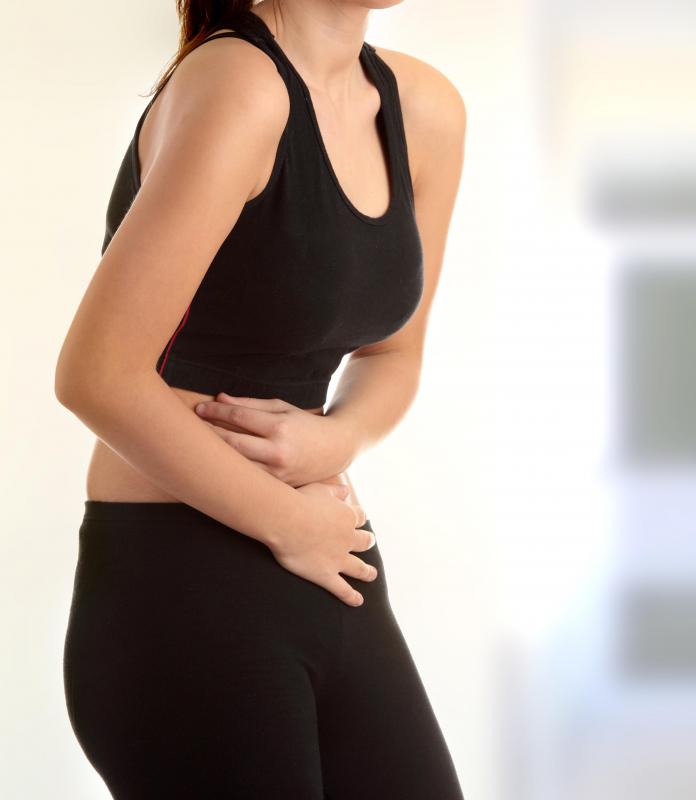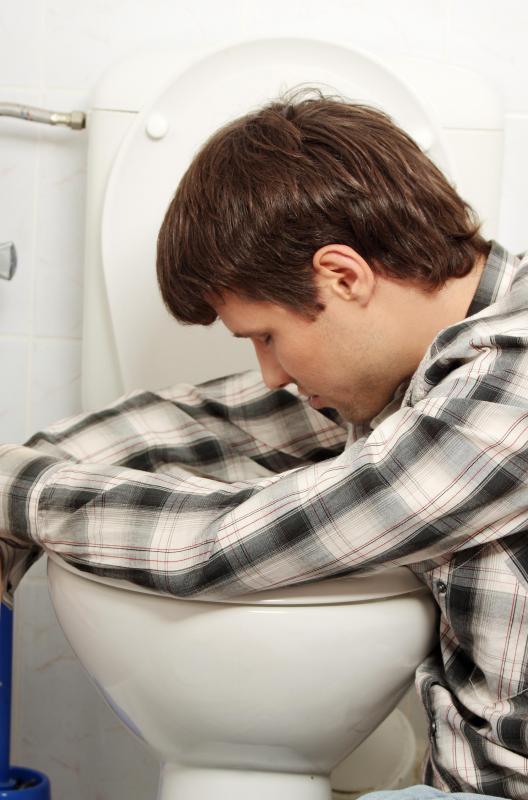At WiseGEEK, we're committed to delivering accurate, trustworthy information. Our expert-authored content is rigorously fact-checked and sourced from credible authorities. Discover how we uphold the highest standards in providing you with reliable knowledge.
What is Diverticulitis?
Diverticulitis is inflammation or infection of diverticula, which are tiny pouches that form in the colon. This inflammation causes abdominal pain and digestive symptoms and can cause bleeding in the colon. Diverticulitis is treated with pain medication and antibiotics when required.
The reason why diverticula form in the colon is not well understood. The prevailing idea is that a low-fiber diet is one of the main causes. A low-fiber diet is implicated because fiber adds bulk and moisture to the stool, which makes it easier to move through the colon. Without the addition of fiber, the colon must work harder to move the stool. This added pressure is thought to push the walls of the colon out at weak spots where blood vessels pass through, which creates the tiny diverticula pouches.

As stool moves through the colon, small amounts of food or stool can enter the diverticula and become trapped. If bacteria are present in the trapped food or stool, inflammation or infection can occur. The result of this is diverticulitis. Symptoms include pain in the lower left belly, bloating, constipation or diarrhea, nausea, vomiting, loss of appetite, fever and chills. Sometimes, the pain is worse during movement.

This disease can be complicated by peritonitis, which can develop if the infection in a diverticulum causes the colon wall to tear. If this occurs, the infection can migrate into the abdominal cavity, causing intense abdominal swelling and pain, vomiting, nausea, a rapid pulse, rapid breathing, chills and fever. If these symptoms develop in someone with diverticulitis, he or she should get emergency medical treatment immediately, because peritonitis is a life-threatening condition if not treated promptly.

Home treatment is sufficient to manage the symptoms of mild diverticulitis. Heating pads can help relieve pain and cramps, and over-the-counter pain relievers can be used as needed. If these measures don’t help manage the pain, a doctor should be consulted. For infection and severe pain, painkillers and antibiotics are prescribed by a doctor. The risk of further attacks can be reduced with a high-fiber diet that is rich in vegetables and whole grains and by drinking plenty of water each day. This way of eating will help bulk up and soften the stool and ease the movement of stool through the colon.

If attacks become frequent or severe, surgery might be needed. The procedure is called a partial colectomy and involves the surgical removal of diseased sections of colon. Once these sections have been removed, the remaining parts are connected. Depending on the severity of the disease, one or more surgeries might be needed to repair the damage.
AS FEATURED ON:
AS FEATURED ON:
















Discussion Comments
I have this condition, and have had it for a few years now. I developed it in my early thirties, and has progressed to get worse. No insurance so have not been able to get the surgery. I also have tearing in some of the polyps that cause internal bleeding when I eat gassy foods.
The past six months have been steady pain, cramping, and the last three months have been steady blood loss. I have developed anemia, and am suffering most days just to bend over. The doctor claims if my bleeding hasn't stopped in three months my colon is not healing and therefore the surgery might pose a higher risk. Fiber only prolonged the issues I am bearing now, and I pray for the surgery now no matter the risks. Some days I bleed so much I am week and light headed, other days I cramp so badly I can barely move. It is like a woman's monthly that started three months ago and just kept going!
My younger brother was diagnosed with this condition after several days of intense abdominal pain and persistent diarrhea. He underwent surgery a week later and passed away suddenly and unexpectedly three days after the surgery.
When he walked through the doors of the hospital to seek medical treatment, little did anyone know we would be planning his funeral 10 days later. I've often wondered what could have been the cause of him contracting this ailment, and also discovered through these posts that this condition isn't necessarily a death sentence.
My diverticulitis has become so severe that I am going to have a partial colectomy. I am scared about it, but I look forward to being pain-free. I have missed so many days of work because of my condition that I have no more vacation days this year.
When I get inflammation, I get it to the extreme. I get so sick at my stomach that I vomit, and I alternate between hot sweats and shaking with chills.
It is terrible to go through this as frequently as I do, and I’m ready to do something drastic to fix it. I just hope there are no complications from the surgery.
@wavy58 - My doctor gave me a diverticulitis diet plan to follow, and it has helped tremendously. However, he did tell me to slowly incorporate more fiber into my diet, because doing this too quickly could overwhelm my system and make things worse.
I eat oatmeal and blueberries for breakfast instead of sweet cereal. When I’m in the mood for something different for breakfast, I eat a whole grain English muffin and a banana.
Black beans, spinach, broccoli, and apples are a few of my favorite fiber sources. When it comes to fruits and veggies, you get more fiber if you eat them raw and don’t peel them. So, I eat a raw spinach salad with a light Italian dressing for flavor every day as part of lunch, and I sprinkle some broccoli on top.
So, can I prevent episodes of pain from diverticulitis by switching to whole grain foods right away? I’m prepared to throw out all my white bread if this is possible.
I am tired of suffering from this condition. I’m already taking a fiber supplement, but I’m sure my diet could stand some improvement.
What types of foods are the best sources of fiber? Obviously, whole grain breads and cereals are better for me, but what other changes can I make?
My dad has diverticulitis, and I recall him being in intense pain several times because of it. He would get infections and lay in bed for days, unable to move around much because of the sharp, localized pain in his abdomen.
He would take pain pills and antibiotics, and the infection would subside, but he seemed to get them frequently. He finally started drinking a powdered fiber solution to help prevent this.
It must have worked, because I cannot recall the last time he had pain from diverticulitis. He drinks the solution every morning, because he is adamant about preventing another attack.
Post your comments